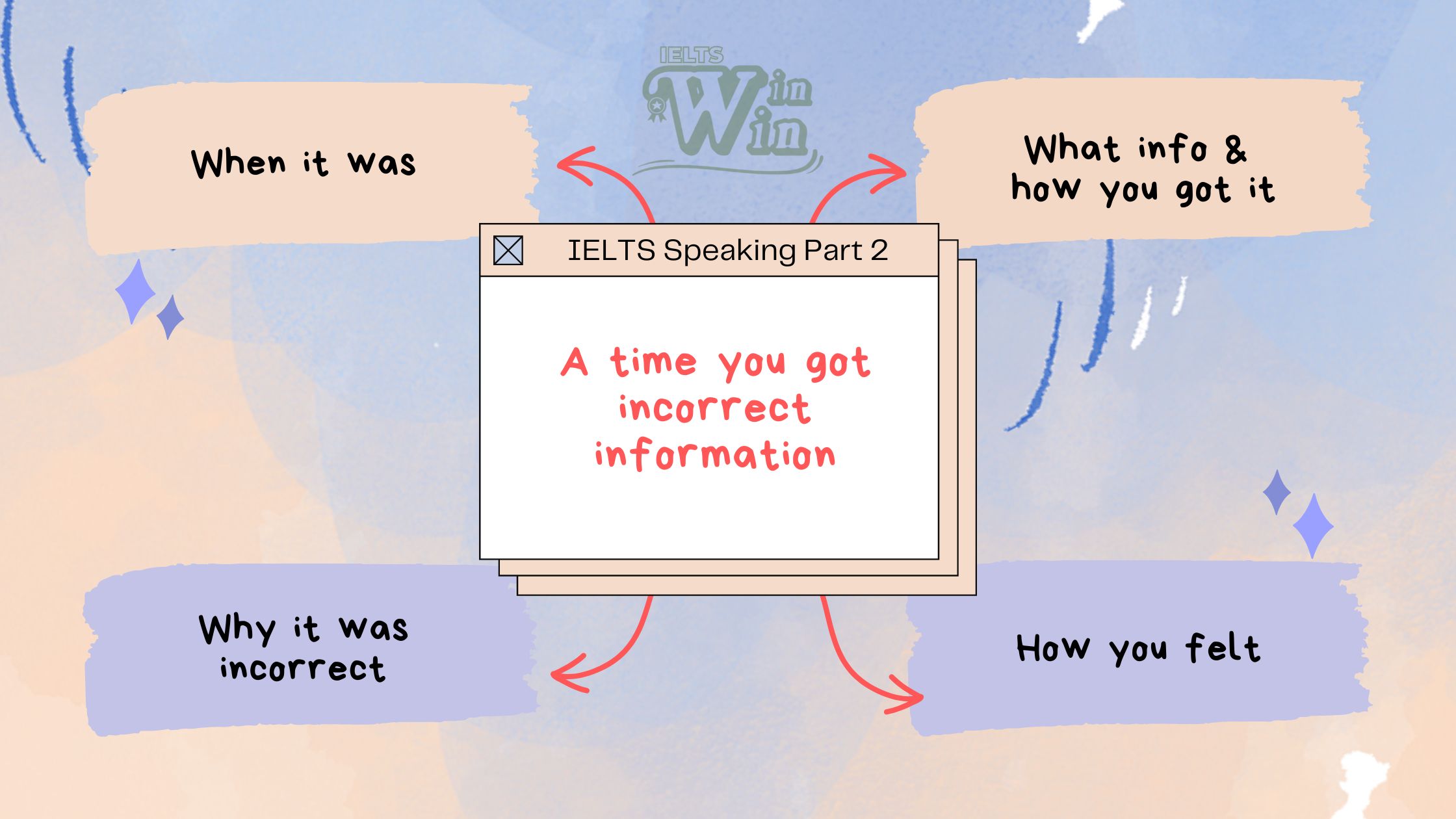✨Part 2: A time you got incorrect information
- When
- What info & how you got it
- Why it was incorrect
- How you felt
A notable incident where I received incorrect information occurred during a school project gathering a few years ago.
It was an exciting time as my classmates and I were organizing a group study session for an important project. One of my friends shared an address they claimed was the location of a spacious library where we could work together. Trusting their information, we all eagerly agreed to meet there. When the day arrived, we set off to the address provided, only to realize that the location did not match our expectations. We were perplexed as we found ourselves in front of a residential building instead of the intended cafe. It became evident that the address we had received was incorrect. Upon reflection, it appeared that my friend had unintentionally shared outdated or mistaken information. Naturally, I felt a sense of disappointment and frustration. The anticipation of a productive study session quickly turned into confusion and wasted time. We had to quickly regroup and find an alternative location, causing unnecessary stress and a delay in our project preparations. This incident served as a valuable lesson in the importance of verifying information and double-checking details. It highlighted the significance of relying on reliable sources and ensuring the accuracy of information shared.
Ultimately, while the incident caused temporary inconvenience and frustration, it became a learning experience for all of us involved. It emphasized the importance of attention to detail and reinforced the need to independently verify information before relying on it.
- incident /ˈɪnsɪdənt/ (n) - sự cố, sự việc bất ngờ xảy ra
- claimed /kleɪmd/ (v) - tuyên bố, đòi hỏi, yêu sách
- spacious /ˈspeɪʃəs/ (adj) - rộng rãi, có không gian rộng lớn
- realize /ˈrɪəlaɪz/ (v) - nhận ra, thực hiện, hiểu rõ
- residential /ˌrezɪˈdenʃl/ (adj) - thuộc về cư dân, thuộc về nhà ở
- double-checking /ˌdʌblˈtʃekɪŋ/ (n) - sự kiểm tra lại một lần nữa, sự xem lại một lần nữa
- inconvenience /ˌɪnkənˈviːniəns/ (n) - sự bất tiện, phiền hà
- independently /ˌɪndɪˈpendəntli/ (adv) - độc lập, không phụ thuộc vào ai hoặc cái gì
Part 3
✨Has the way people get information changed?
Yes, the way people get information has significantly changed with the advent of technology and the widespread use of the internet. Previously, people relied heavily on traditional sources such as newspapers, television, and books. However, nowadays, people increasingly turn to online platforms, search engines, social media, and news websites to access information. The internet has made information more accessible, immediate, and abundant, allowing individuals to find a wide range of sources and perspectives on various topics.
✨What are the advantages and disadvantages of getting information online?
There are several advantages to getting information online. Firstly, the internet provides a vast amount of information on virtually any subject, giving individuals access to diverse viewpoints and global perspectives. Secondly, online information is often available in real-time, allowing people to stay up-to-date with the latest news and developments. Thirdly, online platforms enable interactive and participatory information-sharing, fostering engagement and collaboration. However, there are also disadvantages to consider. Firstly, the internet can be a breeding ground for misinformation, fake news, and biased content, requiring individuals to exercise critical thinking and verify sources. Secondly, the overwhelming amount of information online can be overwhelming and time-consuming to navigate. Lastly, the digital divide and access limitations can create disparities in information access among different populations.
- widespread /ˌwaɪdˈspred/ (adj) - rộng rãi, lan rộng, phổ biến
- platforms /ˈplætfɔːmz/ (n) - các nền tảng, các nền tảng công nghệ
- accessible /əkˈsesəbl/ (adj) - có thể truy cập, có thể tiếp cận
- virtually /ˈvɜːtʃuəli/ (adv) - gần như, hầu như
- perspectives /pəˈspektɪvz/ (n) - quan điểm, góc nhìn
- real-time /ˌriːəl ˈtaɪm/ (adj) - thời gian thực, đồng bộ với thời gian thực
- information-sharing /ɪnfəˈmeɪʃn ˈʃeərɪŋ/ (n) - việc chia sẻ thông tin
- time-consuming /ˈtaɪmkənˌsjuːmɪŋ/ (adj) - tốn nhiều thời gian, lâu dài
✨How can people know the information they have is correct or incorrect?
Verifying the accuracy of information is crucial in the digital age. To determine the reliability of information, individuals can employ several strategies. Firstly, they should consider the credibility of the source. Assessing the reputation, expertise, and bias of the author or organization behind the information can provide insights into its reliability. Secondly, cross-referencing information with multiple sources can help identify consistent and trustworthy information. Thirdly, fact-checking websites and online resources can assist in confirming the accuracy of specific claims or statements. Developing critical thinking skills and being skeptical of sensationalist or unsubstantiated claims are also essential in discerning accurate information.
- strategies /ˈstrætədʒiz/ (n) - chiến lược, sách lược
- expertise /ˌekspɜːˈtiːz/ (n) - chuyên môn, chuyên gia
- cross-referencing /ˌkrɒs ˈrefrənsɪŋ/ (n) - sự tham chiếu chéo, sự liên kết thông tin
- fact-checking /ˈfæktˌtʃekɪŋ/ (n) - sự kiểm chứng sự thật, sự xác minh thông tin
✨Why do people publish fake news on the Internet?
The motivations behind the publication of fake news on the internet can vary. Firstly, some individuals or organizations may spread false information intentionally to manipulate public opinion, advance certain agendas, or gain personal or political advantages. Fake news can be used as a tool for propaganda or to create confusion and chaos. Secondly, the viral nature of social media and online platforms can incentivize the dissemination of sensational and misleading information for attention and clicks, generating revenue through advertising. Additionally, some people may inadvertently share fake news without verifying its authenticity, contributing to the spread of misinformation. The complex interplay of technological, social, and psychological factors contributes to the prevalence of fake news online.
- publication /ˌpʌblɪˈkeɪʃn/ (n) - sự xuất bản, sự phát hành
- propaganda /ˌprɒpəˈɡændə/ (n) - tuyên truyền, cổ vũ
- dissemination /dɪˌsɛmɪˈneɪʃn/ (n) - sự phổ biến, sự truyền bá
- authenticity /ˌɔːθenˈtɪsɪti/ (n) - tính xác thực, tính đáng tin cậy
Xem thêm các bài viết về Speaking Part 2 và 3 ở đây bạn nhé
Đừng ngần ngại để lại thông tin hoặc liên hệ với chúng mình qua địa chỉ sau đây để IELTS WinWin có thể hỗ trợ tốt nhất cho bạn nhé!
Địa chỉ: 118 Nguyễn Xuân Khoát, P. Tân Thành, Q. Tân Phú, TP. Hồ Chí Minh.
Fanpage: IELTS WinWin
Zalo: 0965 439 239 – 085 301 8788
Website: ieltswinwin.com



